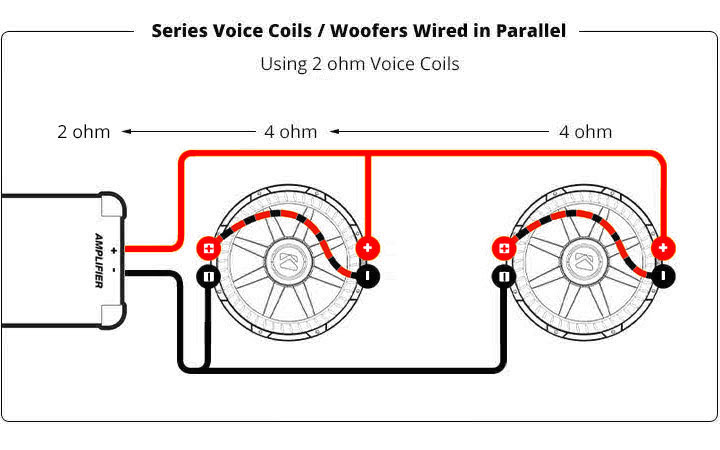Want to crank up the bass and feel the music in your bones? If you've got a dual voice coil (DVC) subwoofer, you're in luck! Understanding how to correctly wire a DVC subwoofer can significantly enhance your car audio system's performance. This guide will walk you through the intricacies of dual voice coil subwoofer wiring, empowering you to unleash its full potential. Let’s dive in and unlock the power within your subwoofer.
Dual voice coil subwoofers offer greater flexibility in how they can be connected to an amplifier, compared to single voice coil models. This allows for configurations that maximize power handling or offer different impedance options, giving you more control over your system's setup. Incorrect wiring, however, can lead to underperformance or even damage to your equipment. That's why it's crucial to understand the different wiring options and how to implement them correctly.
The history of dual voice coil subwoofers is tied to the ever-increasing demand for more powerful and adaptable car audio systems. As music genres like hip-hop and electronic music gained popularity, so did the desire for deep, impactful bass. DVC subwoofers emerged as a solution, offering more control over impedance and power handling, allowing for optimized performance in various setups. This flexibility has made them a staple in high-performance car audio systems.
Bridging a dual voice coil subwoofer essentially means connecting both voice coils to the amplifier in a specific way to achieve a desired impedance. The primary challenge lies in understanding the implications of each wiring configuration – series vs. parallel – and ensuring it's compatible with your amplifier's specifications. A mismatch can lead to inefficiency, distortion, or even damage to your equipment. Mastering these configurations is key to getting the best performance out of your DVC subwoofer.
Before diving into the wiring process, it's important to grasp some basic concepts. Impedance, measured in ohms, is a measure of resistance to electrical current. Wiring the coils in series effectively adds their individual impedances, while wiring them in parallel divides the impedance. For instance, if your DVC subwoofer has two 4-ohm voice coils, wiring them in series results in an 8-ohm load, while wiring them in parallel creates a 2-ohm load. Your amplifier needs to be compatible with the final impedance of the subwoofer.
Connecting dual voice coil subwoofers offers several advantages. First, it provides flexibility in matching impedance to your amplifier for optimal power transfer. Second, it allows for bridging, potentially increasing the power delivered to the subwoofer. Third, it can improve bass response and overall sound quality by optimizing the interaction between the amplifier and subwoofer.
Here's a step-by-step guide to bridging a dual 4-ohm voice coil subwoofer to achieve an 8-ohm load (series configuration): 1. Connect the positive terminal of the first voice coil to the positive terminal of the amplifier. 2. Connect the negative terminal of the first voice coil to the positive terminal of the second voice coil. 3. Connect the negative terminal of the second voice coil to the negative terminal of the amplifier.
For a parallel configuration (resulting in a 2-ohm load): 1. Connect the positive terminals of both voice coils to the positive terminal of the amplifier. 2. Connect the negative terminals of both voice coils to the negative terminal of the amplifier.
Advantages and Disadvantages of Bridging
| Advantages | Disadvantages |
|---|---|
| Increased power handling | Potential for damage if the amplifier is not compatible with the final impedance |
| Improved bass response | Can be more complex to wire than single voice coil subwoofers |
Best Practices: 1. Always consult your amplifier and subwoofer manuals. 2. Double-check your wiring before powering on your system. 3. Use high-quality speaker wire. 4. Ensure proper enclosure for your subwoofer. 5. Break in your subwoofer gradually.
FAQs: 1. What is the difference between series and parallel wiring? 2. How do I know what impedance my amplifier can handle? 3. Can I damage my subwoofer by wiring it incorrectly? 4. What gauge wire should I use? 5. What is the benefit of bridging a DVC subwoofer? 6. How do I know if my subwoofer is wired correctly? 7. What are the symptoms of an impedance mismatch? 8. Where can I find more information on subwoofer wiring?
Tips and Tricks: Use a multimeter to verify your final impedance. Pay attention to the subwoofer's thermal limits. Experiment with different wiring configurations to find what sounds best in your vehicle.
In conclusion, understanding how to wire a dual voice coil subwoofer is essential for maximizing your car audio system’s performance. By carefully considering the impedance of your amplifier and subwoofer, and choosing the appropriate wiring configuration, you can unlock the full potential of your DVC subwoofer, experiencing deeper, richer, and more impactful bass. Correctly bridging your DVC subwoofer not only enhances your listening experience but also protects your equipment from damage. Taking the time to understand and implement these techniques will reward you with a truly immersive audio experience. Don’t settle for less – unleash the full power of your bass!
How To Wire Dual 4 Ohm Subwoofer - Trees By Bike
Single Subwoofer Ohms Wiring Diagram - Trees By Bike
How To Bridge Dual Voice Coil Subwoofer - Trees By Bike
How To Wire In Amp And Sub - Trees By Bike
How To Wire Up Subwoofers - Trees By Bike
Subwoofer Wiring Diagrams Dual Voice Coil - Trees By Bike
Wiring A Powered Subwoofer - Trees By Bike
What Is A Dual Coil Sub - Trees By Bike
Dual Voice Coil Wiring - Trees By Bike
4 Ohm Dual Voice Coil Sub Wiring - Trees By Bike
How To Wire Single Subwoofer - Trees By Bike
Diagram showing examples of dual voice coil subwoofer advantages - Trees By Bike
How To Wire Dual Voice Coil Speakers - Trees By Bike












